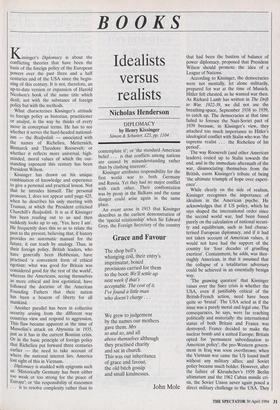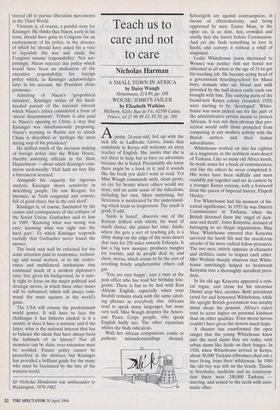BOOKS
Idealists versus realists
Nicholas Henderson
DIPLOMACY by Henry Kissinger Simon & Schuster, £25, pp. 1104 Kissinger's Diplomacy is about the conflicting theories that have been the basis of the foreign policy of the European powers over the past three and a half centuries and of the USA since the begin- ning of this century. It is not, therefore, an up-to-date version or expansion of Harold Nicolson's book of the same title which dealt, not with the substance of foreign policy but with the methods.
What characterises Kissinger's attitude to foreign policy as historian, practitioner or analyst, is the way he thinks of every move in conceptual terms. He has to see Whether it serves the hard-headed national- ism — the Realpolitik — associated with the names of Richelieu, Metternich, Bismarck and Theodore Roosevelt; or whether it reflects more universal, high- minded, moral values of which the out- standing exponent this century has been President Wilson.
Kissinger has drawn on his unique combination of knowledge and experience to give a personal and practical lesson. Not that he intrudes himself. The personal pronoun, I, does not appear until page 425, when he describes his only meeting with Truman, at which the President criticised Churchill's Realpolitik. It is as if Kissinger has been reading out to us and then Suddenly looks up to say, 'Yes, here I am'. He frequently does this so as to relate the past to the present, believing that, if history provides no automatic manual for the future, it can teach by analogy. Thus, in their foreign policy, British leaders, who have generally been Hobbesian, have practised 'a convenient form of ethical egotism: what was good for Britain was considered good for the rest of the world', Whereas the Americans, seeing themselves as more ethical and less egotistical, have followed the doctrine of the American Founding Fathers that their nation has been a beacon of liberty for all mankind.
Another parallel has been in collective security arising from the different way countries view and respond to aggression. This flaw became apparent at the time of Mussolini's attack on Abyssinia in 1935, just as it has in the current Bosnian crisis. Or in the basic principle of foreign policy that Richelieu put forward three centuries earlier — the need to take account of Where the national interest lies. America lost sight of this in Vietnam.
Diplomacy is studded with epigrams such as: 'Historically Germany has been either too weak or too strong for the peace of Europe'; or 'the responsibility of statesmen - . . is to resolve complexity rather than to
contemplate it'; or 'the standard American belief . . . is that conflicts among nations are caused by misunderstanding rather than by clashing interests'. Kissinger attributes responsibility for the first world war to both Germany and Russia. Yet they had no major conflict with each other. Their confrontation was by proxy in the Balkans and the same danger could arise again in the same place. An event arose in 1915 that Kissinger describes as the earliest demonstration of the 'special relationship' when Sir Edward Grey, the Foreign Secretary of the country that had been the bastion of balance of power diplomacy, proposed that President Wilson should promote the idea of a League of Nations.
According to Kissinger, the democracies were not mentally, let alone militarily, prepared for war at the time of Munich. Hitler felt cheated, as he wanted war then. As Richard Lamb has written in The Drift to War, 1922-39, we did not use the breathing-space, September 1938 to 1939, to catch up. The democracies at that time failed to foresee the Nazi-Soviet pact of 1939 because, in Kissinger's view, they attached too much importance to Hitler's ideological conflict with Stalin who was 'the supreme realist . . . the Richelieu of his period'.
The way Roosevelt (and other American leaders) cozied up to Stalin towards the end, and in the immediate aftermath of the war, disassociating themselves from the British, earns Kissinger's tribute of being 'the ultimate triumph of hope over experi- ence'.
While clearly on the side of realism, Kissinger recognises the importance of idealism in the American psyche. He acknowledges that if US policy, which he says shaped the international order since the second world war, had been based purely on the calculation of national securi- ty and equilibrium, such as had charac- terised European diplomacy, and if it had not taken account of American values, it would not have had the support of the country for 'four decades of gruelling exertion'. Containment, he adds, was thor- oughly American, in that it assumed that the collapse of a totalitarian adversary could be achieved in an essentially benign way.
'The gnawing question' that Kissinger raises over the Suez crisis is whether the USA, even if justifiably critical of the British-French action, need have been quite so 'brutal'. The USA acted as if the issue was a purely moral and legal one. The consequences, he says, were far reaching politically and materially: the international status of both Britain and France was destroyed; France decided to make the nuclear bomb and a united Europe; Britain opted for 'permanent subordination to American policy'; the pro-Western govern- ment in Iraq was soon overthrown; when the Vietnam war came the US found itself without any military allies; and Soviet policy became much bolder. However, after the failure of Khrushchev's 1959 Berlin ultimatum and the 1962 Cuban missile cri- sis, the Soviet Union never again posed a direct military challenge to the USA. They
veered off to pursue liberation movements in the Third World.
Vietnam is, of course, a painful story for Kissinger. He thinks that Nixon, early in his term, should have gone to Congress for an endorsement of his policy, in the absence of which he 'should have asked for a vote to liquidate the war and made the Congress assume responsibility'. Not sur- prisingly, Nixon rejected this policy which would have been an abdication of the executive responsibility for foreign policy which, as Kissinger acknowledges later in his account, the President alone possesses.
Admiring of Nixon's 'geopolitical intuition', Kissinger writes of his hard- headed pursuit of the national interest which Nixon's critics considered a form of 'moral disarmament'. Tribute is also paid to Nixon's opening to China, a step that Kissinger was simultaneously proposing. Nixon's warning to Russia not to attack China is described as 'perhaps the most daring step of his presidency'.
He shifted much of the decision making of foreign policy into the White House, thereby annoying officials in the State Department — about which Kissinger com- ments sardonically: 'Hell hath no fury like a bureaucrat scorned.'
Alongside his capacity for rigorous analysis, Kissinger shows sensitivity in describing people. He saw Reagan, for instance, as 'both congenial and remote, full of good cheer, but in the end aloof.
Kissinger is, of course, fascinated by the causes and consequences of the collapse of the Soviet Union. Gorbachev said to him in 1989, 'Knowing what was wrong was easy; knowing what was right was the hard part'. To which Kissinger responds ruefully that Gorbachev never found the answer.
The book may well be criticised for the scant attention paid to economics, technol- ogy and social matters, or to the confer- ences and multilateral institutions that command much of a modern diplomat's time; but, given his background, he is sure- ly right to focus on the major political and strategic moves, in which these other issues will be subsumed, which will always com- mand the main squares in the world's game.
The USA will remain the predominant world power. It will have to face the challenges it has hitherto eluded: is it a model, or does it have a mission; and if the latter, what is the national interest that has to balance the ideals that have always been the hallmark of its history? Not all monsters can be slain; over-extension must be avoided. Future policy cannot be prescribed in the abstract; but Kissinger has provided a brilliant guide for the many who must be fascinated by the fate of the western world.
Sir Nicholas Henderson was ambassador to Washington, 1979-1982.



























































 Previous page
Previous page